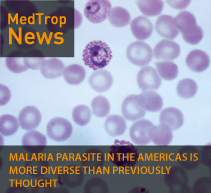
If you can not see this message correctly, click here.
Read our news in portuguese

|
Newsletter - Issue 75 |
BSTM social networks! 

|
||

Second autochthonous case of kala-azar is confirmed in Florianópolis
Controlling visceral leishmaniasis (canine and human) requires an integrated effort by public health and epidemiological surveillance organs as well as the population After confirming three kala-azar cases (human visceral leishmaniasis) in Porto Alegre (RS), the Epidemiological Surveillance from Florianopolis, Santa Catarina, neighbor state, confirmed the second autochthonous case of the disease on September 13. 

Professor at the Ribeirão Preto Medical School from USP, Luiz Tadeu Figueiredo believes the Saint Louis encephalitis virus and probably the Rocio have Always been in Brazil producing sporadic or small outbreaks that are often mistaken with dengue Infection by Rocio and Saint Louis viruses may become emerging in BrazilArboviral diseases are a severe public health issue in the Country. The risk for new arboviral diseases in Brazil is related to the existence of large, populous cities infested by the Culex mosquito, the common mosquito, as well as the Aedes aegypti. Among the Brazilian arboviruses, the Mayaro, Dengue, Yellow Fever, Rocio and Oropouche (OROV) account for over 95% of the human arboviral diseases. Among the encephalitis in Brazil, Rocio and Saint... 
The scientist has been awarded by the British government for his researches on Leishmaniasis in Brazil, when he was granted the Order of the British Empire Dr. Jeffrey Shaw will be one of the honorees during the 66th Annual Meeting of the ASTMHDuring the 66th Annual Meeting of the American Society of Tropical Medicine and Hygiene (ASTMH), to take place from November 5 to 9, in Baltimore, Maryland, USA, Dr. Jeffrey Jon Shaw, nominated by the former president of the Brazilian Society of Tropical Medicine (BSTM) Mitermayer Galvão dos Reis, supported by three other researchers - Prof. Edgar Marcelino Carvalho, Prof. Phillip Scott and... 
Biting midges: the smallest blood-eating dipteran, neglected but important
Mansonelliasis is usually related to biting midges, a neglected disease of broad distribution in the Americas and in Africa. It not only causes problems per se, but also triggers complications for diagnostic and treatment of other filariasis A recent report of infection cases by the Oropouche virus in Salvador and nearby cities has drawed attention towards the small biting midges. The study of these dipteran flies, the smallest blood-eating insects, has been neglected, for their size (1-2 mm), and sometimes even 4 mm and for apparently being simply annoying. |

Infectious diseases have served as an excuse to change the Global Health agenda
I believe there are urgent sanitary issues in the developed world as well The matter I currently research is exactly because the WHO considers one event an emergency, and so many others not The Brazilian Society of Tropical Medicine's (BSTM) Press office interviewed Doctor in International Law and Master's in Community and European Law at Paris University, Deisy Ventura, who stressed the regretful situation... 
Below is a selection of for this month of October of publications related to Tropical Medicine from important international journals. Europe needs to prepare for the coming epidemic – Prof. Yves Lévy Authorities intensify spraying for mosquitoes Central America 'kissing bug' carries two main subtypes of Chagas disease parasite Number of cities in São Paulo affected by leishmaniasis increases The “epidemic” that will kill more than cancer (if not prevented) Dengue-transmitting mosquito detected in Portugal 
|

|

|
|
Brazilian Society of Tropical Medicine - Center for Tropical Medicine - UnB |